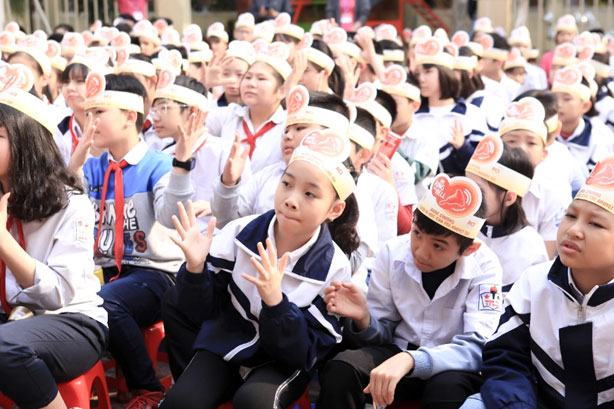 Inclusive education is one of key themes of Research Center for Inclusion that aims at improving access to quality of inclusive education for children with disability through a chain of actions including:
Inclusive education is one of key themes of Research Center for Inclusion that aims at improving access to quality of inclusive education for children with disability through a chain of actions including:
-
-
-
-
- strengthening operations of support centers for inclusive education;
- developing teacher training manuals on all types of disabilities
- building teachers’ capacity;
- delivering sexual and reproductive heath and rights education for youth with disability;
- enhancing leadership roles of children with disability in school activities.
-
-
-

Recent Inclusive Educations Projects including Education without Exception – Reaching the Unreached was co-implemented in 2017 with other partners from LINC Asia (Liliane Foundation Inclusion Network) and other project Increasing participation of children with disability in inclusive education (2018-2020) was implemented in 3 provinces of Hoa Binh, Quang Tri and Quang Nam in Vietnam.
PROJECTS
Sponsor: by Stichting Liliane Fonds/Liliane Foundation (Netherlands).
Objectives: The project aims at ensuring children with disability in Da Nang, Quang Tri and Hoa Binh are in primary and secondary schools attaining quality inclusive education. The project’s initial focus will be on primary education and in a later stage also include secondary education.
Duration: from 1/1/2018 to 31/12/2020
Implementing organizations: RCI works closely with its partner organizations are Microfinance & Community Development Institute (MACDI), Quang Tri Charity Association (QCA) and Vietnam Health Improvement Project (VNHIP)
Project areas: Hoa Binh, Quang Tri and Quang Nam provinces, Vietnam
Components:
-
- Improve capacity of teachers and school leaders and related stakeholders in the 3 project target provinces to prepare for the transition of children with disability to mainstream settings.
- Improve multi-sectors’ coordination in mobilizing resources for creating disability-friendly and inclusive schools and classrooms in 3 project target provinces
- Increase participation of children with disability (CwD) in mainstream schools in Da Nang, Quang Tri and Hoa Binh provinces in Vietnam
- Establish relationship and coordination mechanism between special schools and mainstream schools in Da Nang, Quang Tri and Hoa Binh provinces to support inclusive education for children with disability
Sponsor: Stichting Liliane Fonds/Liliane Foundation (Netherlands).
Objectives: The project aims at improving access to quality and disability-friendly education for school children with disabilities, increasing confidence and leadership of students with disability through their active participation in student-led activities at mainstream schools and strengthening implementation of inclusive education policies and influencing the project provinces to replicate the project model.
Duration: from 01/07/2020 to 30/06/2023
Implementing organizations: Research Center For Inclusion (SPO) in combination with 2 partner organizations (PO) are: QCA (Quang Tri Charity Association) and VNHIP (Vietnam Health Improvement Project)
Project areas: Gio Linh District, Quang Tri Province and Dien Ban District, Quang Nam Province, Vietnam
Components:
1. Skilled and qualified teachers at mainstream schools established to teach children with special needs and family-enabling environment created:
(1) Launch planning/kick-off workshops with the participation of partners, local authorities, and project schools to sensitize stakeholders of the project;
(2) Establish and run Support Units for inclusive education (IE) within project schools’ premises at the project sites of both IE 2396 and this proposed project, in consultation with the National Center for Special Education under the Vietnam National Institute of Educational Sciences;
(3) Finalise and test teacher training flash card manual in collaboration with the National Center for Special Education and LF Rehabilitation Advisor. Publish training flash card manual to distribute to stakeholders in year 3;
(4) Organise trainings for teachers, including sign language teachers who teach children with disabilities. The trainings also aim to support teachers in delivering Circular 32 new program efficiently to children with disabilities. Trainers are experts from the National Center for Special Education, using flashcards from activity 1.3. Mentoring and coaching sessions are followed
(5) Send selected and qualified teachers, expectedly two teachers per province to intensive training programs organized at national levels to gain a higher and more in-depth level of knowledge and skills on inclusive education;
(6) Organise exchange and learning visits for teachers and school leaders from the new project district to learn from the current IE 2396 project;
(7) Celebrate Teacher Awards Ceremonies to honor and recognize those who greatly enable children with disability to achieve significant success in their studies;
(8) Organise trainings for parents and caretakers on caring and supporting the learning of children with disabilities in families;
(9) Carry out community/family talks for parents and get-to-together activities for children with disabilities in the presence of their parents, which aims to enable parents to share caring and supporting experiences of their children with disabilities with each other
2. Formalities of involvement of children with disabilities at school and community activities promoted and replicated to other schools:
(1) Promote Student-led school Assembly with participation of children with disabilities in project schools to enhance their confidence and leadership;
(2) Coach students with disabilities to document the project activities throughout the project lifespan from their own perspectives. This activity aims to increase their skills in linking and connecting of issues and ideas together;
(3) Strengthen the development of cognitive and life skills for children with disability through outdoor activities such as Children Day, Disability Day, learning visits to handicraft villages, and reading and learning fairs to enable children with disability to learn and explore a world out of their homes and schools;
(4) Honour children with disabilities who perform outstanding study results and personal skill development to inspire their peers.
3. Mechanism for scaling up the application of the project model to other areas established:
(1) Activate periodic dialogues with the leaders the project provincial Department of Education and Training and school leaders to lobby for schools’ commitment of standing and permanent teachers for Support Units for Inclusive Education;
(2) Evaluate the impacts or relevance of Circular 32 new program to children with disabilities;
(3) Document good practices and lessons learned from the project for dissemination and influencing the provinces and Ministry of Education and Training to replicate the model.
